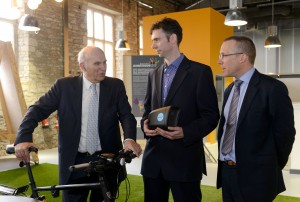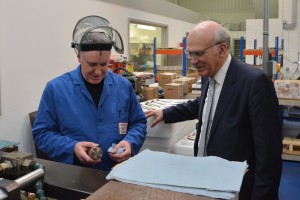Small firms such as those putting the West of England in the vanguard of UK innovation still lack adequate access to finance, Business Secretary Vince Cable admitted yesterday on a visit to Bristol.
He said he was determined to get the high street banks to lend more to businesses while also encouraging less established and new entrants to the business finance market.
He also praised the West of England Local Enterprise Partnership (LEP) which covers Bristol, South Gloucestershire and North Somerset, for its partnership approach to economic regeneration. 
Pictured: Vince Cable with Jim Hutchinson of Fusion Processing and Engine Shed director Nick Sturge
Speaking after visiting Bristol-based specialist precision engineering firm Redcliffe Precision, meeting the LEP board for a round table discussion on the key issues in driving growth and job creation, and touring the Engine Shed innovation hub in Bristol, Dr Cable described Bristol as the most successful city outside London with that success largely down to its advanced manufacturing and creative industries.
He said he was impressed with the region’s creative businesses, some of which he met as he toured the SETsquared fast-growth business incubator.
“I’ve met some of them today and they are really outstanding,” he said
But he added: “They still face challenges such as raising money. ![BkTYNmZIcAAq1E0[1]](http://www.bristol-business.net/wp-content/uploads/2014/04/BkTYNmZIcAAq1E011-225x300.jpg)
“The biggest problem is raising funding because the banks have become very conservative and we don’t have an effective venture capital industry in this country.
Pictured: Vince Cable at Bristol's Engine Shed with director Nick Sturge
“That is why I am launching a business bank which will encourage angel investors and other forms of lending. I am also pushing our banks to lend more.”
Speaking about the LEP, he said it was a true partnership between local authorities in the West of England, business organisations such as the CBI, chambers of commerce and FSB (Federation of Small Business) and the higher and further education sector.
The Government had got to allow LEPs to make decisions at a local level to encourage growth and private sector investment.
“We can’t run everything from Whitehall,” he said.
Dr Cable’s whistle-stop tour of some of Bristol’s innovative and growing businesses included meeting a number that were recently awarded funding from the LEP’s £25m Growth Fund to see how the money has helped local businesses to grow.
During his tour of Engine Shed – the £1.6m refurbishment of Brunel’s original train station and a unique collaboration between the University of Bristol, the LEP and Bristol City Council – Dr Cable met three fast-growing, highly-successful businesses based at the SETsquared incubation centre: Blu Wireless Technology, Plexus Planning and Fusion Processing.
Blu Wireless, which is developing low-cost wireless gigabit communications technology, was awarded £1m from the Growth Fund, the largest single award to date.
Fusion Processing is using its knowledge of leading-edge sensor fusion technology to produce a gadget for HGVs and buses that detect cyclists in a ‘danger zone’ around the vehicle and alerts the driver.
Plexus Planning helps firms avoid the enormous cost and timescale overruns common in large-scale, complex projects and their supply chains.
Mayor of Bristol George Ferguson and LEP chair Colin Skellett talked Dr Cable through the plans for Bristol Temple Quarter Enterprise Zone. His visit ended at the Pervasive Media Studios at Watershed, where he met PocketSpaceCraft.
Mr Skellett said: “We were pleased to have the opportunity to showcase some of the innovative and internationally significant projects in our region. It was good to be able to demonstrate how the local Growth Fund money has helped local companies to grow. The first round of our West of England Growth Fund has allocated almost £15m to nearly 150 local businesses and this in turn has attracted more than £52m of private sector investment.
“The LEP Board also had the opportunity to discuss with the Secretary of State what else needs to be done, in particular, to support SMEs, to develop the skills we need for a growing economy and to continue to grow our successful inward investment capabilities”.
Mr Sturge, who is also a director of SETsquared, added: “We were pleased to welcome Dr Cable back to SETsquared in our new home and to be able to demonstrate some of the cutting-edge technologies being developed here.”
Mayor Ferguson said: “Enterprise zones are an important part of the Government’s plans for growth across the UK. I was pleased to be able to share with the minister our dynamic plans for the future development of Bristol Temple Quarter Enterprise Zone, one of the largest regeneration projects in the UK, that will deliver mixed use development, 17,000 jobs over 25 years, a new performance arena and will be the principal new gateway for the city region.”
At Redcliffe Precision’s Ashton Vale factory, Dr Cable saw how recent investment by the small-but-growing family-run engineering firm is putting it at the leading edge of UK manufacturing.
Its new state-of-the-art five-axis machinery and engineering design and programming capability have enabled it to compete successfully on the international stage in the aerospace supply chain, robotics and F1 motorsport sectors.
As a result, substantial orders have been won for airframe components that would otherwise have been sourced from India or further afield. Also investment in a high-precision gang tool lathe has contributed to Redcliffe winning work ahead of competitors in Europe
Redcliffe has been awarded a grant from the Growth Fund to support its ambitious plans to develop a centre of excellence for thread rolling.
The funding will enable it to invest in a further electric – as opposed to hydraulic – thread-rolling machine which will increase capacity and the company’s capability to roll more difficult threads, building on its successful history and continuing its growth.
Thread rolling is a process for manufacturing very high precision threads. The thread is formed by simultaneously spinning and squeezing the blank part with tremendous pressure between two grooved rollers on specially made machines. The bolts and shafts manufactured with this process have significantly higher accuracy, are stronger and more resistant to fatigue failure, than when manufactured by alternative means such as cutting the thread. Parts from each batch are destructively tested and undergo a microstructure examination to ensure they are as strong and as reliable, as possible.
Following his visit to Redcliffe Precision Dr Cable said: “Our aerospace industry is a national success story, and companies like Redcliffe Precision are helping to strengthen the quality and depth of the supply chain.”
Redcliffe managing director Kevin Sage added: “The support that we have had from the Growth Fund towards developing our centre of excellence for thread rolling has allowed us to accelerate our investment plans in advanced manufacturing technology and will create new employment opportunity in a high tech engineering sector.
“A substantial proportion of what we manufacture is exported, which is good both for jobs and for the UK as a whole."
The firm employs more than 40 staff including three apprentices. Its customers include global aerospace giants such as Airbus, Boeing, Bombardier, Dassault, GKN and AgustaWestland.
Pictured: Vince Cable at Redcliffe Precision






























